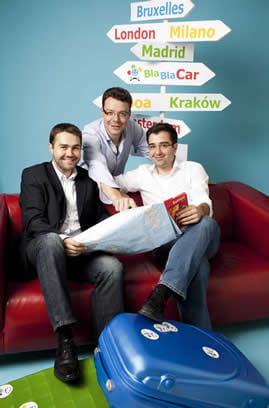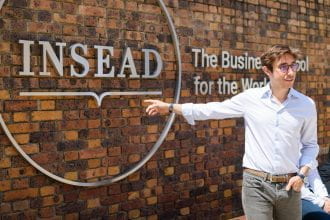The INSEAD Venture Competition puts students and their business ideas to the test, inspiring them to be their best
Fred Mazzella MBA ’07D, and Nicolas Brusson MBA ’07J, chose the INSEAD MBA programme aware of the school’s potential to advance their professional aspirations. Less obvious was how the experience would also prove pivotal for their successful ride-sharing venture, BlaBlaCar.
The INSEAD alumni, who each spent years in Silicon Valley during the initial dotcom boom, credit the school’s entrepreneurial approach as instrumental in helping them develop a business idea that Fred had begun working on earlier. In particular, their winning performance in the twice-yearly INSEAD Venture Competition (IVC) let them obtain valuable insights from top industry practitioners, including venture capital investors.
“INSEAD helped me gain the right tools to build a robust business from scratch,” recalls Fred, CEO of BlaBlaCar, the company he co-founded with Nicolas, the firm’s COO.
Begun in 2000 as a way to challenge MBA and EMBA students to turn their knowledge into a real business venture, the IVC is a rigorous, multistage contest that culminates with the best six teams pitching their businesses to a panel of investor judges. With a top prize of €10,000 and a €5,000 prize for the second-place winner, as well as €5,000 for the Coromandel Foundation Social Impact Award winner, the IVC is an excellent way for students to jumpstart their start-up dreams.
“The IVC helps participants get good ventures started right away,” says Heinrich Greve, the INSEAD Chaired Professor of Organisation and Management Theory, and Chair of the Entrepreneurship and Family Enterprise Area. “The competition provides a deadline, judges, feedback, recognition, prizes—everything needed to assess whether the venture should launch.”
Along with Greve, INSEAD Affiliate Professor of Entrepreneurship Paul Kewene-Hite is a driving force behind the IVC’s success since 2009. With nearly 25 years of experience with startups and major technology firms, Kewene-Hite has provided his insight as a mentor and consultant to countless students and clients. He says some students come to INSEAD intending to launch a business and many work on those plans throughout their MBA programme. “The IVC allows them to learn how professional entrepreneurs and investors judge a venture’s readiness,” he says, adding that judges examine the venture’s viability and execution, as well as the team making the pitch. “Team and execution are more critical than any idea.”
 Greve says that the faculty’s teaching approach is much bigger than the IVC: “We want our participants to manage ventures well, not just start them.”
Greve says that the faculty’s teaching approach is much bigger than the IVC: “We want our participants to manage ventures well, not just start them.”
For Fred and Nicholas, the IVC helped them turn an inventive idea into a business sooner rather than later.
“The inspiration for the company came after I returned from a three-year stint in the U.S.,” says Fred, who was working in Silicon Valley as a NASA researcher. He was then commuting between San Francisco and Palo Alto, where he earned a master’s degree in computer science from Stanford, each day sharing his car with friends headed in the same direction.
The epiphany came one Christmas when, back in France, Fred tried to return home from Paris to his family in the countryside. “I had no car and all the trains leaving Paris were full,” he recalled. “I ended up riding home with my sister who picked me up. When I saw all the single-driver cars on the road, that’s when I imagined the prospects for a ride-sharing service, one synchronised though the web and mobile devices.”
Fred soon coded and deployed the first version of his ride-sharing platform. He joined INSEAD because of its respected entrepreneurship programme, with the intention of launching a real business based on this promising initial experiment. He met Nicholas during the MBA programme.
Nicolas is a transport industry and venture capital expert who earned a degree in optics from Ecole Superieure d’Optique and a master’s degree in applied physics from Paris XI University. He recalls the IVC as being “a truly structuring experience.”
“When I came back from seven years of start-up experience in Silicon Valley and met Frederic,” says Nicholas, “I immediately fell in love with the project. We both recognised that we would make complementary partners. IVC forced us to structure our plan from product to international growth, but the experience also enabled us to build our relationship as future partners.”
Originally launched in France as Covoiturage.fr, BlaBlaCar today is a Paris-based venture with teams in across Europe. It describes itself as “a trusted community marketplace that connects drivers with empty seats to passengers looking for a ride.” The company, which includes Co-Founder and CTO Francis Nappez, has enjoyed widespread press, is backed by Accel Partners and claims more than 8 million members across 12 countries in Europe, with some 1 million people using the service each month.
The company’s model has been called the purest version of “the sharing economy,” since drivers are discouraged from making a profit. The firm recommends prices based on fuel costs and distance. Nicholas says, “We are careful so that drivers don’t make a profit. They offset a cost. We don’t recruit drivers. It’s real people that drive these routes.” The company also is careful to obey all transport regulatory rules, avoiding any illegality that could occur if they established regular routes. Such a practise, Nicholas says, “also would break the spirit of sharing that is our foundation.”
BlaBlaCar’s founders discovered that the IVC is an excellent networking event for entrepreneurs, angel investors and venture capitalists. It’s also a key element in INSEAD’s entrepreneurship ecosystem, says Greve, but he’s quick to point out that the IVC is not an entrepreneurship course per se. “The judges evaluate venture ideas without concern for how they were made,” he notes.
“We teach the components that make ventures good, how to put the components together, and how to present them for judgement to investors and potential alliance partners,” says Greve, whose expertise includes strategic change and organisational innovation.
For Kewene-Hite, a venture capitalist and turnaround expert, “execution detail with contingency planning” is critical when he judges the IVC teams. “People tend to rely heavily on market analysis or product definition for their [venture’s] argument, when what investors really need is insight into the detail of how the work will be accomplished,” he says.
Since its inception, the IVC has facilitated many businesses—including ones focused on food, education, high-tech and energy. There’s been a recent move toward ventures based on advanced technology, thanks to INSEAD’s relationships with research institutions that produce commercially valuable technology.
The IVC is funded by a donation from Rudolf and Valeria Maag to the INSEAD Centre for Entrepreneurship (ICE). However, this support is intended for a portfolio of initiatives. Greve and Kewene-Hite would like to encourage additional alumni support for the IVC.
“We love alumni involvement,” says Kewene-Hite. “It would be helpful for those who are qualified investors to volunteer as judges for one of the competition’s three phases. Funding a prize is also an excellent way to get involved.”
Currently, Malik Kasmi MBA ’14J, funds the Coromandel Foundation Social Impact Award with a gift of €5000. With more financial support, the IVC can continue to advance innovative businesses and share the ideas that drive them.
“The IVC is a high-profile event that brings attention to INSEAD and the venture winners,” says Greve. “We publish the stories of our IVC winners so that our alumni can learn directly from these ideas at the early stage and as the ventures mature. The initiative is an important part of how ICE informs alumni about what our current participants and recent graduates are doing.”
For more information about how to get engaged with the INSEAD Venture Competition, and to learn about the most recent winners, visit our site.


